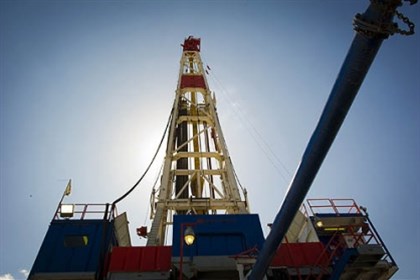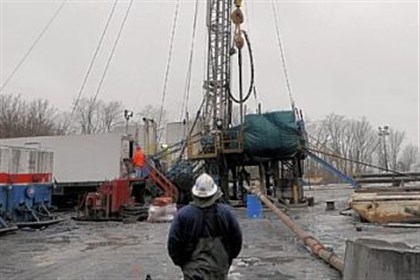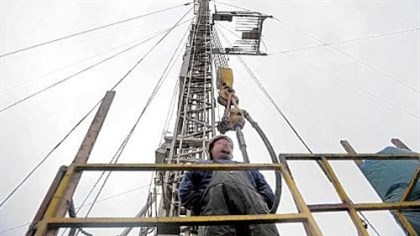Pennsylvania Supreme Court declares portions of shale-drilling law unconstitutional
December 20, 2013 12:03 AMThe Pennsylvania Supreme Court declared major provisions of the state's Marcellus Shale drilling law, Act 13, unconstitutional Thursday, including one that allows gas companies to drill anywhere, overriding local zoning laws.
The court's decision, on a 4-2 vote, also sent back to Commonwealth Court for review and disposition challenges by a physician to the Act 13 provisions that would have prevented doctors from telling patients about health impacts related to shale gas development, and a constitutional challenge that the law benefits a single industry.
Voting in the majority, which held that "several challenged provisions of Act 13 are unconstitutional," were Chief Justice Ronald Castille, and Justices Debra McCloskey Todd, Seamus McCaffery and Max Baer. Justices Thomas Saylor and J. Michael Eakin filed dissenting opinions.
Deron Gabriel, commission president in South Fayette, the only Allegheny County municipality to challenge the shale gas law passed in 2012, said the decision validating municipalities' zoning rights was a victory for all residents of the county and the state.
"Preserving zoning is vital to local planning efforts, in order to keep industrial activity out of residential and commercial areas," Mr. Gabriel said. "Now we can keep industrial activities away from our school and residences, and there's been more and more of a push by the industry to locate closer to the residential areas."
"We got the major thrust of what we were looking for. The drill-everywhere provision was declared unconstitutional and that part of the law was permanently enjoined," said John Smith, the lead attorney representing South Fayette and the other municipalities that brought the case.
Mr. Smith later issued a statement thanking the municipalities that signed up to challenge the law which was sought by the industry.
"A debt of gratitude," he wrote, "is owed to all municipalities and individuals who fought so hard to ensure that their rights and the rights of Pennsylvania citizens were not cast aside in favor of corporate interests."
In addition to South Fayette, the municipal plaintiffs included Peters, Mount Pleasant and Robinson townships in Washington County, and Nockamixon and Yardley in Bucks County in Eastern Pennsylvania.
In affirming the municipalities' standing to bring the Act 13 challenge, which was challenged by the state's attorneys, Chief Justice Castille wrote in the 162-page majority decision that "[t]he protection of environmental and esthetic interests is an essential aspect of Pennsylvanians' quality of life and a key part of local government's role."
The decision also notes "how remarkable a revolution is worked by this legislation (Act 13) upon the existing zoning regimen in Pennsylvania, including residential zones," and it questions whether the General Assembly can pass laws inconsistent with the constitutional mandate to protect the environment.
"By any responsible account," Chief Justice Castille wrote, "the exploitation of the Marcellus Shale Formation will produce a detrimental effect on the environment, on the people, their children, and the future generations, and potentially on the public purse, perhaps rivaling the environmental effects of coal extraction."
He goes on to say that although the state's regulatory powers are broad, they are "limited by constitutional demands, including the Environmental Rights Amendment."
The decision sent shock waves through the shale gas industry, which had sought legislation guaranteeing uniform statewide land use rules, and the Corbett administration and legislators who had championed passage of the oil and gas law changes.
Gov. Tom Corbett, who had supported and signed the legislation into law in February 2012, issued a statement saying he was disappointed by the decision. He maintained that Act 13 improved environmental protections while respecting local government rights.
"I will continue to work with members of the House and Senate to ensure that Pennsylvania's thriving energy industry grows and provides jobs while balancing the interests of local communities," Mr. Corbett said.
Marcellus Shale Coalition president Dave Spigelmyer issued a statement saying the industry lobbying organization was reviewing the decision to determine its impact on shale gas operations across the state.
Mr. Spigelmyer said the decision also is a reminder to policy makers of the state's ongoing business climate challenges.
"If we are to remain competitive and our focus is truly more job creation and economic prosperity," he said, "we must commit to working together toward common sense proposals that encourage -- rather than discourage -- investment into the Commonwealth."
Rep. Jesse White, D-Cecil, an outspoken opponent of Act 13, hailed the ruling as an affirmation of the state constitution's guarantee of "clean air and clean water" and the self-governance rights of local communities.
He said "a clear message has been sent to Gov. Corbett and his friends in the energy industry: Our fundamental constitutional principles cannot be auctioned off to wealthy special interests in exchange for campaign dollars. On this day, David has defeated Goliath."
Senate President Pro Tempore Joe Scarnati, R-Jefferson, and House Speaker Sam Smith, R-Jefferson, issued a joint statement saying they were "stunned" by a ruling "which will so harshly impact the economic welfare of Pennsylvanians" and criticized the opinion written by Chief Justice Castille for relying on "inaccurate anecdotes and unproven science."
"The consequences of this decision will likely be the increase of natural gas prices for consumers, while at the same time costing a multitude of jobs in Pennsylvania," they wrote.The two Jefferson County legislators also were critical of the Pennsylvania State Association of Township Supervisors, which they said supported the laws zoning language in legislative discussions prior to its passage, but opposed it in court.
State Senate Minority Leader Jay Costa, D-Forest Hills, and Sen. Matt Smith, D-Mt. Lebanon, said in separate releases that the Supreme Court's decision gives state legislators and the Corbett administration a second chance to craft a shale gas law that protects the environmental, property and health interests of state residents. Adam Garber, field director with PennEnvironment, a statewide environmental advocacy organization, said the court's decision shows that the state constitution's environmental rights provisions have "serious teeth."
"The Legislature made a huge overreach in trying to take over regulation of gas drilling from local municipalities," Mr. Garber said. "The court said there are serious health and environmental impacts from gas drilling that the Legislature did not address and that local communities ought to."
Don Hopey: dhopey@post-gazette.com or 412-263-1983.
Don Hopey: dhopey@post-gazette.com or 412-263-1983. First Published December 19, 2013 3:19 PM



















